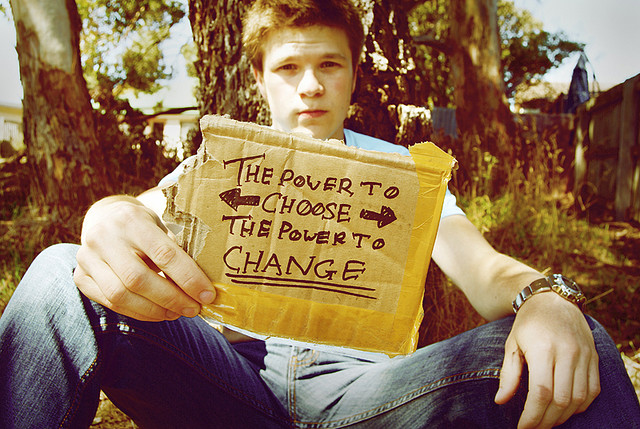
Like so many, I’ve spent my life opting for a stable job, long-term relationships and unbreakable friendships.
I subconsciously chose permanence, but it wasn’t long before I lost jobs, romantic relationships were torn apart, solid friendships ended and death took away people I loved.
But one day I stumbled upon a book, “What Makes You Not a Buddhist,” by Dzongsar Jamyang Khyentse.
Throughout the book he tackles impermanence and how oblivious we are to it. It was the first time something I read had slapped me awake.
These were the words that got me:
“In our everyday lives we have this impulse to shield ourselves and others from the truth of impermanence. We’ve become impervious to obvious signs of decay. We encourage ourselves by “not dwelling on it” and by employing positive affirmations. We celebrate our birthdays by blowing out candles, ignoring the fact that the extinguished candles could equally be seen as a reminder that we are a year closer to death. We celebrate the New Year with firecrackers and champagne, distracting ourselves from the fact that the old year will never come back and the new year is filled with uncertainty; anything can happen.
When that “anything” is displeasing, we deliberately divert our attention, like a mother distracting a child with rattles and toys. If we feel down, we go shopping, we treat ourselves, we go to the cinema. We build fantasies and aim for lifetime achievements; beach houses, plaques and trophies, early retirement, nice cars, fame, making it into The Guinness Book of World Records.
Later in life we want a devoted companion with whom we can take a cruise or raise purebred poodles. Magazines and television introduce and reinforce such models of happiness and success, ever inventing new illusions to trap us. These notions of success are our own grown-up baby rattles. Hardly anything we do in the course of the day, neither in our thoughts nor in our actions, indicates that we are aware of how fragile life is. We spend our time doing things like waiting at the multiplex for a bad movie to start. Or rushing home to watch reality TV. As we sit watching commercials, waiting…our time in this life ebbs away.”
And then it struck me. Do I really believe in impermanence? Are my actions and thoughts aligned with this notion?
I felt sad realizing just how much I, and others, resist change. I suddenly woke up to the fact that everything that we do in our lives is a subconscious attempt at building something permanent.
On an intellectual level, we all know what impermanence is—we go to funerals, watch the news and see how many lives end every day. But when it comes to living from the concept of impermanence, we fail deeply. When something ends, we rush to build something new, and with every new beginning we silently think, “This is the one that will last.”
Even when we are standing before something that is in the process of ending—like a relationship—we act out of our belief in permanence and try to stop the change taking place. Instead of going with the change, we push to make the old last.
We seek out the cycle of good, but refuse to live the bad. We celebrate birth, but refuse death. We adore success, but despise failure. We love beginnings, but loathe endings.
We recognize impermanence, but don’t act from it. Like Khyentse said, we distract ourselves with fame and things, houses and cars, and live as if everything will remain the same.
For me, life changed to a great extent when I realized that whatever is rising is also passing. I’m constantly trying my best to not accumulate things that keep me stuck in the idea of permanence. Even when I begin new friendships or relationships, in the back of my head I know that this, too, will one day end—if not because of the two of us, it will eventually end because of death. I began enjoying everything more once I realized it wouldn’t last.
Permanence simply opened up a portal of appreciation for my present moment.
If only we could think of impermanence on a deeper level and live from its truth, our life would be the complete opposite of how it is now. When we realize that every phenomenon is passing, our suffering will lessen. Instead of running in the opposite direction, we will go “with” change.
To act from a space of impermanence, we first must know that the problem resides within us. We need to recognize that we cling and keep ourselves in unfathomable situations because the new feels threatening and displeasing. When we start believing in impermanence, we stop running after what is offering us only temporary happiness, like recognition, fame and fancy things.
Only then can we appreciate and enjoy every single moment, no matter how good or bad we perceive it to be. It’s like when we’re on vacation and try to make the most of our last day. We must realize that life is a vacation that will eventually end.
So let’s focus on enjoying it, rather than trying to make it last.
Author: Elyane Youssef
Editor: Nicole Cameron
Image: Simon Greening/Flickr


 Share on bsky
Share on bsky





Read 0 comments and reply